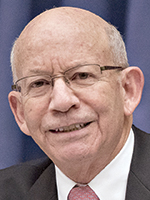Senior Reporter
FAST Act’s Yearlong Extension Signed Into Law

[Stay on top of transportation news: Get TTNews in your inbox.]
The law governing the country’s transportation operations was extended for a year after President Donald Trump’s recent signing of a temporary funding measure that averts a shutdown of the federal government.
The stopgap appropriations law funds the government through Dec. 11.
Tucked in the funding law is the yearlong extension of the FAST Act highway law, which was set to expire Sept. 30.
Transportation policymakers on Capitol Hill argued they simply ran out of time to reauthorize the FAST Act. The yearlong extension, which ensures temporary funding for highway and transit programs, offers a window of opportunity to produce a significant new highway policy bill, lawmakers claimed.
“A full one-year extension of highway funding provides states and communities the certainty required to plan for critical road and bridge projects,” Sen. John Barrasso (R-Wyo.), chairman of the committee on highways, said Sept. 30. Republican leaders did not put on the Senate floor his committee’s bipartisan update of the FAST Act. Barrasso added, “The extension will give Congress more time to finish a long-term, bipartisan highway bill to rebuild our roads and bridges.”

DeFazio
“With this one-year extension in place, we can continue work on a long-term, transformational bill that significantly boosts investment in our surface transportation network and moves our transportation systems into the 21st century,” said Rep. Peter DeFazio (D-Ore.), chairman of the House transportation panel.
This summer, House Democrats led the party-line passage of an infrastructure package totaling more than $1 trillion. The package included a reauthorization of the FAST Act. Senate Republicans did not consider the House-passed bill. Neither the House nor the Senate highway proposals pitched a long-term fix for the looming insolvency of the Highway Trust Fund. The federal highway account funds surface transportation systems around the country via revenue from the fuel tax. The 24.4 cents-per-gallon diesel tax and 18.4 cents-per-gallon gas tax were set in 1993.

What are industry executives doing to help bring more women into the fold, not only as drivers, but in leadership roles? Host Michael Freeze talks with Ellen Voie of Women In Trucking and Debora Babin Katz of TrucBrush Corp. Hear a snippet, above, and get the full program by going to RoadSigns.TTNews.com.
The White House, which has not unveiled a comprehensive infrastructure policy plan this year, opposed the House’s infrastructure bill. At the State of the Union address, the president called on Congress to support Barrasso’s committee-approved highway measure.
Groups representing freight firms, state agencies, transit operators, the construction sector and unions had pressed members of Congress to agree on a highway bill prior to the Sept. 30 authorizing deadline. Most of these stakeholders have endorsed raising fuel taxes to generate new revenue for highway programs.
Jim Tymon, executive director of the American Association of State Highway and Transportation Officials, said, “We look forward to working with Congress and committee staff on a reauthorization that will address the challenges facing surface transportation, including the need for a long-term fix for the Highway Trust Fund.”
“The [FAST Act] extension provides some stability for states to continue important transportation infrastructure projects for another year, but unfortunately falls short of the long-term reauthorization that we had hoped for,” said Terry O’Sullivan, general president of the Laborers’ International Union of North America.
Besides advocating for a long-term highway policy bill, key sectors across the transportation networks have urged Congress to approve pandemic-related emergency aid. The airlines, state agencies and transit operators have each called for multi-billion dollar boosts.
After top-level negotiations on the next pandemic relief package stalled in Washington, the House is considering an aid measure about $1 trillion less than a $3 trillion bill they passed a few months ago. The measure lacks a Senate companion.

“[Treasury] Secretary [Steve] Mnuchin and I had an extensive conversation and we found areas where we are seeking further clarification. Our conversations will continue,” said Speaker Nancy Pelosi (D-Calif.) on Sept. 30.
Senate Majority Leader Mitch McConnell of Kentucky criticized the Democrats’ latest plan. Senate Republicans have sought to advance relief aid focusing on health care providers, school reopenings and the business community. As he put it, “Speaker Pelosi’s latest offering still does not include a single cent of new money for the [Small Business Administration’s] Paycheck Protection Program, to help small businesses that are going under. It does nothing to help schools, universities, doctors, nurses or employers avoid frivolous lawsuits.”
The temporary funding extension adds to Congress’ agenda in the post-election lame-duck session.
Want more news? Listen to today's daily briefing:
Subscribe: Apple Podcasts | Spotify | Amazon Alexa | Google Assistant | More

